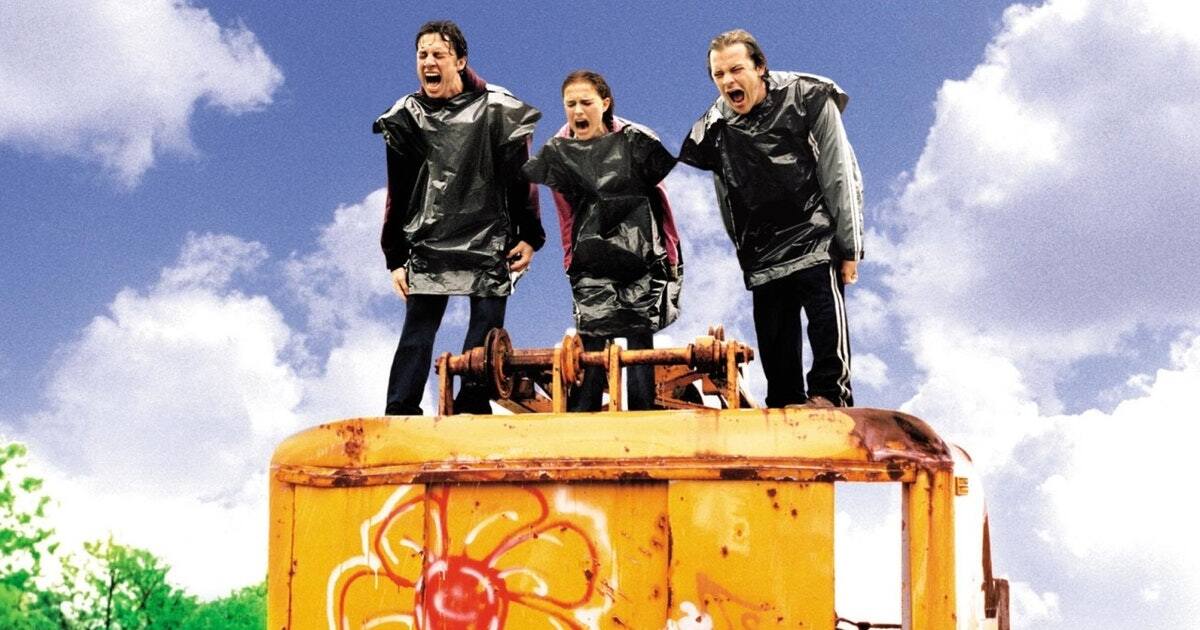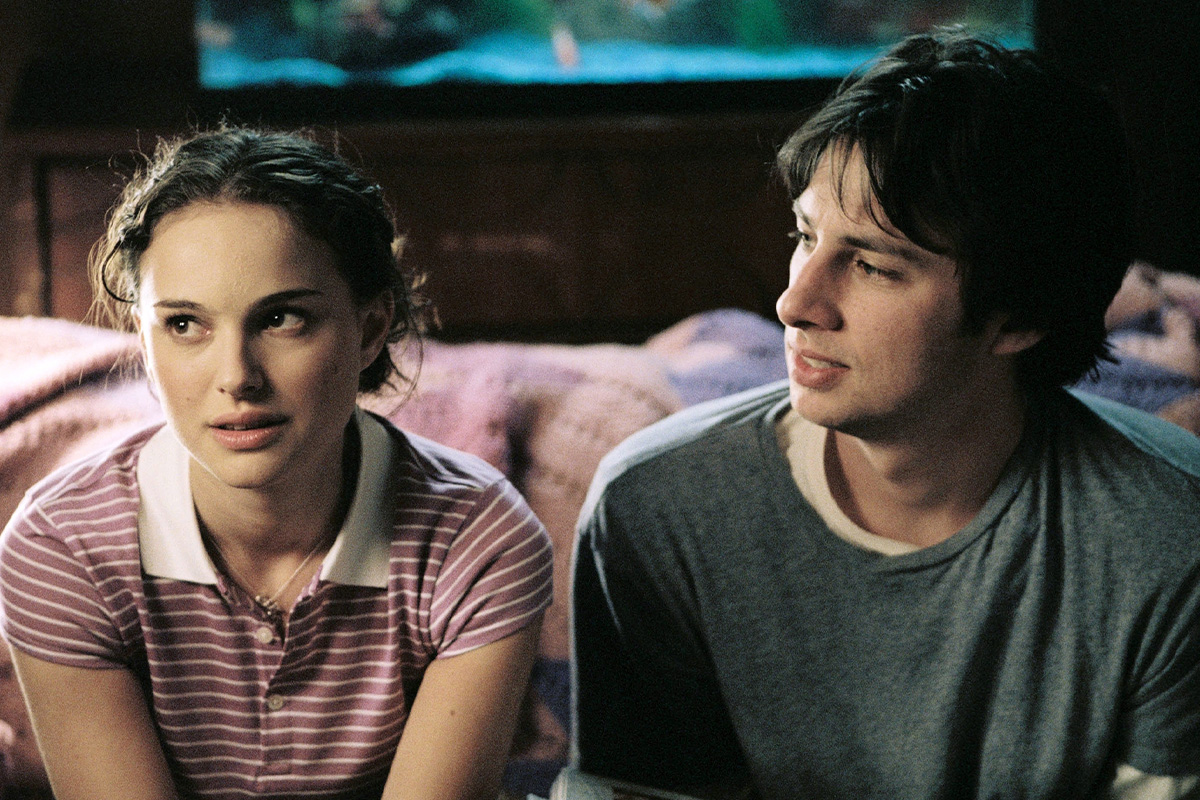I have long been a person who ravenously consumes media about white men’s listlessness — the Decemberists, the National, Bright Eyes, John Steinbeck, Herman Melville… the list goes on. Those bands (and books) share themes of uprootedness, restlessness and nostalgia that constantly come back to me, especially when I revisit the cultural touchstones that shaped my teenage years. Which brings us to my recent re-watching of 2004’s “Garden State,” which is at its core a paean to 20-something mid-Atlantic white boy ennui.
This movie is in turns uplifting, tender, funny and very difficult to watch. It follows the story of Andrew “Large” Largeman (Zach Braff), a struggling actor in Los Angeles who returns home to New Jersey for his mother’s funeral. Andrew reconnects with old friends who work as gravediggers in his hometown’s Jewish cemetery and strikes up a relationship with an eccentric woman (Sam, played by Natalie Portman) who changes his life. Andrew is overmedicated and failing to live up to anyone’s expectations, least of all those of his father (played brilliantly by an at-his-actual height Ian Holm, which is funny for those of us who can really only see him as Bilbo Baggins).
Andrew is very Jewish, which is a fact that I had entirely forgotten, despite being keenly aware of writer-director-star Zach Braff’s membership in the tribe. The funeral scene is filled with mourners wearing yarmulkes, the reception at Andrew’s childhood home rings true to every shiva I’ve ever experienced, and the movie’s constant casual references to Jewishness are spot-on. The film’s most explicitly Jewish moment occurs during a hamster funeral (it’s a quirky movie, OK?) in which Andrew explains the Wailing Wall and Yom Kippur to Sam. The moment made me laugh because, despite Sam’s lack of Jewishness, Portman was literally born in Jerusalem — I don’t think she needs anyone to tell her what the Wailing Wall is.
Sam is one of the quintessential examples of the Manic Pixie Dream Girl trope. In his review of the film, Roger Ebert called her “a local girl who is one of those creatures you sometimes find in the movies, a girl who is completely available, absolutely desirable and really likes you.” This description feels undeservedly belittling, but it makes a fair point about how Sam is portrayed. On occasion, Sam’s ebullient childlikeness is difficult to watch, and the moments when her humanity shines through are few and far between. Regardless, Sam’s connection with Andrew has moments of sweetness and maturity despite its total separation from reality.
The Manic Pixie Dream Girl of it all is tempered by the fact that every character in the film seems to exist to serve the needs of the protagonist — Peter Sarsgaard’s stoner gravedigger Mark lacks interiority as much as Portman’s Sam. In fact, no one in this movie is fully formed, even the protagonist — he puts up a wall between himself and everyone else, including the audience. Are we supposed to root for Andrew or just follow him in the rut he is barely trying to escape? His existence in the film serves as a dissection (or perhaps a celebration or even a reinforcement) of stereotypical upper class Ashkenazi Jewish neurosis. I don’t love that this problematic vision of white American Jewishness is so full-throatedly reinforced in the film, but the fact that it is autobiographical (Braff was raised by a cadre of psychiatrists and therapists) makes it ring true.
I should add that as much as “Garden State” thoughtfully honors neurodiversity, the depictions of people with disabilities (namely Sam, who has epilepsy, and Andrew’s mom, who is paraplegic) leave much to be desired. The constant use of the R-slur is jarring in 2021 to say the least, and there are multiple horrifying references to Andrew’s disabled mom being better off now that she’s deceased. Sally Hayward’s 2005 article in Disability Studies Quarterly dissects this much better than I can.
So why does this movie still matter to me after all these years?
At this point it should come as no surprise that I love fantastical films about mortality (often with Jewish connections). “Garden State” is sincere and strange in a way that reminds me of other movies I love, namely the extremely weird 2007 Jesse Eisenberg film “The Living Wake,” the 2012 Aubrey Plaza/Mark Duplass vehicle “Safety Not Guaranteed,” and Jewish icon Andy Samberg’s recent time loop romcom “Palm Springs.” Braff described “Garden State” as a “Wizard of Oz-like journey through suburbia,” which feels apt, if lofty.
Perhaps predictably, the movie holds up because of its music. Braff wrote the script with certain songs in mind, and the Grammy-winning soundtrack vaulted some of its featured acts (including the Shins) into the mainstream. The story feels like it’s in service of the songs, not the other way around.
“Garden State” (along with “Scrubs,” also starring Zach Braff) shaped, or maybe sparked, my teenage music taste. It’s entirely possible that the first time I heard the Shins’ “New Slang” was when Sam handed Andrew her headphones in a neurologist’s waiting room. “This song will change your life,” she says, and I’m inclined to agree.
Maybe my only attachment to this movie is one of nostalgia, of the continuing restlessness and uprootedness of my late 20s. Now that I am the same age as Andrew and his friends, their experiences in the film feel simultaneously more tangible and less comprehensible. The stereotypes of Jewish neurosis are still in the back of my head, but they echo much more quietly now that I understand more fully the scope and diversity of American Jewish experiences beyond my east coast upbringing.
After all this time, my favorite moment in the film remains the same. On a rainy afternoon after a day of surreal New Jersey adventures, Andrew, Mark and Sam visit the home of a couple who live in a boat at the bottom of a quarry (one of the more on-the-nose Noah’s Ark references I have ever encountered). “For me, the idea was that [Andrew] himself is trying to begin anew,” Braff said in an interview. “He’s trying to rescue all the parts of himself that he likes and start a whole new chapter of his life, the way Noah put the animals and people on the ark and saved them from the apocalypse and started again. He’s trying to find his ark.”

On their way home, Andrew, Sam and Mark climb onto an old crane, rusting on the edge of a seemingly bottomless pit, and scream into “the infinite abyss” as Simon & Garfunkel’s “The Only Living Boy in New York” plays. I don’t care if it’s too earnest, too uncool — in all honesty, no movie scene has ever felt like a more apt depiction of this time in my life.
Late Take is a series on Alma where we revisit Jewish pop culture of the past for no reason, other than the fact that we can’t stop thinking about it?? If you have a pitch for this column, please e-mail submissions@heyalma.com with “Late Take” in the subject line.




